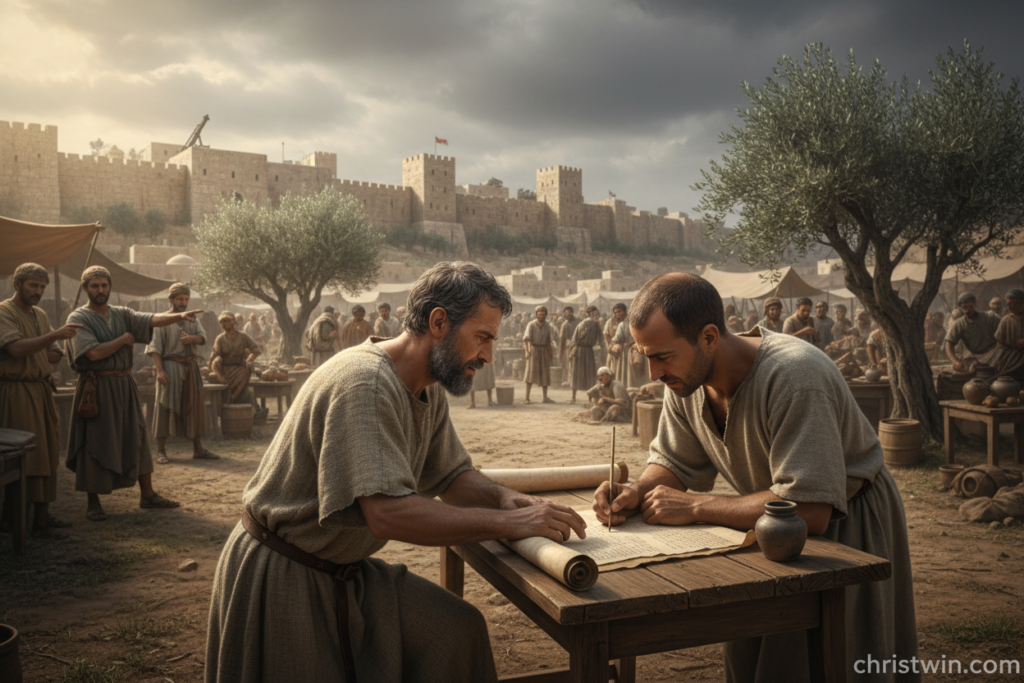Have you ever felt like a problem was too big to solve? Maybe you’re facing a challenge that seems too hard. It’s normal to ask: is there anything too hard for God? The Bible gives a clear answer in Jeremiah 32:27. This verse shows God’s power and ability to do the impossible.
Jeremiah 32:27 (AMP) says, “Behold, I am the LORD, the God of all flesh; is anything too difficult for Me?” This question highlights God’s endless power and wisdom. For believers, it reminds us that with God, nothing is too hard. Other Bible verses, like Luke 1:37 and Luke 18, also show God’s unlimited power to help us.
Knowing that God can do miracles today can bring comfort. He can change any situation for His glory.
Is There Anything Too Hard for God? Explanation of Jeremiah 32:27
Jeremiah 32:27 talks about God’s power. It’s a key part of the Bible that shows God’s strength. It also talks about faith.
Original Hebrew Translation and Meaning
The original Hebrew of Jeremiah 32:27 is very deep. It says, “Behold, I am the LORD, the God of all flesh; is there anything too hard for me?” (Jeremiah 32:27, NKJV). The word “too hard” comes from “to be wonderful” or “beyond human.” It shows God can do what we can’t.
God’s Rhetorical Question Unpacked
God’s question in Jeremiah 32:27 is not asking. It’s a strong statement about His power. It tells us nothing is too hard for God. This question helps us believe in God’s power, even when things seem impossible.
Some important parts of God’s question are:
- God says He is the LORD, the God of all flesh. This shows His power and authority.
- He asks if anything is too hard for Him. This shows His endless power.
- He calls us to have faith in Him. He wants us to trust in His power to do the impossible.
The Power of Divine Declaration
The statement in Jeremiah 32:27 is more than words. It’s a strong message of faith. It reminds us God’s power is not bound by human limits or situations.
Some important points of this declaration are:
- Omnipotence in Action: Shows God’s power in creation and history.
- Faith Encouragement: Tells us to have faith in God’s power to do the impossible.
- Hope in Despair: Gives hope in hard times by saying God can help.
Looking at Jeremiah 32:27 helps us understand God’s power better. It shows us the endless possibilities with faith in God’s power.
The Immediate Context: Jeremiah’s Land Purchase
In the midst of chaos, Jeremiah got a special message from God. He was told to buy a field, showing hope in dark times. This story, in Jeremiah 32, shows God’s endless power and Jeremiah’s strong faith.

God’s Command to Buy Land During Siege
God told Jeremiah to buy land when Jerusalem was under siege. The city was trapped by enemies, and hope seemed lost. But God wanted Jeremiah to buy a field in Anatoth, showing His control.
This was more than just a business deal. It was a sign of faith in God’s promises. You too can trust in God’s strength, even when things look bad.
Jeremiah’s Obedience Despite Circumstances
Jeremiah obeyed God’s command, showing his faith in God’s power. Despite the siege, Jeremiah did what God said. His actions showed his trust in God’s control over everything.
When you face tough times, remember Jeremiah’s story. Trusting in God means following His commands, even when they’re hard. Jeremiah’s faith shows that believing in God means acting on that belief.
The Symbolism of Hope in Despair
The land purchase was a sign of hope in dark times. It showed God was in charge, even when it seemed not. This act of faith reminded everyone of God’s presence and power to change any situation.
Remember Jeremiah’s story when you’re facing big challenges. It teaches us to trust in God’s strength. This story encourages us to have faith in God’s ability to make things better, no matter how bad they seem.
Theological Implications of God’s Unlimited Power
God’s power has big and deep meanings. Jeremiah 32:27 shows us how God can do anything. It changes how we see God’s control and our choices.
God’s Omnipotence in Biblical Theology
God’s power is key in the Bible. It shows who God is and what He does. God’s power is talked about a lot in the Bible.
Key aspects of God’s omnipotence include:
- The ability to accomplish anything without limitation
- The power to fulfill promises and prophecies
- The capacity to intervene in human affairs
In Jeremiah 32:27, God asks, “Behold, I am the Lord, the God of all flesh; is there anything too hard for me?” This question shows God’s endless power. It reminds us He can do the impossible.
Divine Sovereignty Over Human Affairs
God’s control over everything is called divine sovereignty. This includes our lives, where God guides us.
Understanding God’s control can be hard. But it’s key to seeing God’s role in our lives. It tells us to trust in God’s strength always.
The Relationship Between God’s Power and Human Freedom
God’s power and our freedom are linked but tricky to understand. God’s control isn’t limited by our choices. Yet, our actions matter.
Here are some key points to consider:
- God’s sovereignty and human freedom are not mutually exclusive
- Our choices can be part of God’s plan
- Trusting in God’s power can liberate us to make decisions that align with His will
In conclusion, God’s unlimited power, as seen in Jeremiah 32:27, gives us deep insights. It shows God’s power, control, and our freedom. As believers, we should nothing is impossible for god. We should trust in His strength every day.
Biblical Examples of God Doing the “Too Hard”
The Bible is full of stories where God does the “too hard.” These stories show us God’s unlimited power. They tell us to trust in His strength when we face big challenges.
Creation Ex Nihilo
Creating the universe from nothing is a big example of God doing the “too hard.” In Genesis 1:1, it says, “In the beginning, God created the heavens and the earth.” This shows God’s great power, making everything from nothing.

The Exodus and Parting of the Red Sea
The Exodus is another great story. In Exodus 14:21-31, God parted the Red Sea. This saved the Israelites from the Egyptian army. It shows God can solve our big problems in unexpected ways.
The Virgin Birth and Resurrection of Christ
The birth of Jesus and His resurrection are key to Christian faith. They are huge “too hard” feats by God. The virgin birth showed God’s power over human limits. The Resurrection showed God’s victory over death, giving us salvation.
Other Miraculous Demonstrations of God’s Power
There are many more stories in the Bible:
- The provision of manna in the wilderness (Exodus 16)
- The conquest of Jericho (Joshua 6)
- Daniel’s deliverance from the lions’ den (Daniel 6)
- The apostles’ miraculous works in the early church (Acts 2-5)
These stories tell us that with God, anything is possible. They encourage us to trust in God’s power for our own challenges.
Thinking about these stories can help us trust God more. Remember, God can handle our big problems.
Parallel Passages About God’s Unlimited Power
Many Bible passages say the same thing as Jeremiah 32:27. They all talk about God’s endless power. This gives comfort and strength to those who face big challenges.

Genesis 18:14 – “Is Anything Too Hard for the LORD?”
In Genesis 18, God talks to Abraham. He promises Abraham a son, even though Sarah is old. Abraham laughs, and God asks if anything is too hard for Him.
This shows God’s endless power. It means He can do anything He promises, no matter how hard it seems.
Matthew 19:26 – “With God All Things Are Possible”
Jesus talks to His disciples about divorce. They ask about remarriage. Jesus says it’s hard to stay unmarried.
The disciples say it’s better not to marry. Jesus agrees. He says some people choose to stay unmarried for the kingdom.
Jesus says, “With God all things are possible” (Matthew 19:26). This shows God’s power is not limited by humans.
Luke 1:37 – “Nothing Will Be Impossible With God”
The angel Gabriel tells Mary she will have a son, Jesus. Mary asks how, as she is a virgin. Gabriel says, “nothing will be impossible with God” (Luke 1:37).
This shows God’s power to do amazing things. It’s like Jeremiah 32:27.
Job 42:2 – “No Purpose of Yours Can Be Thwarted”
In Job, Job learns about God’s power after a lot of suffering. He says, “I know that you can do all things, and that no purpose of yours can be thwarted” (Job 42:2).
This shows Job understands God’s endless power. It’s a strong message about God’s plans.
These passages all say the same thing as Jeremiah 32:27. They tell us that with God, nothing is impossible. They encourage us to trust in God’s power when we face big challenges.
Understanding the Boundaries of God’s Power
Understanding God’s power is hard. We need to think about what the Bible says. Jeremiah 32:27 helps us see how powerful God is.
Things God Cannot Do (Logical Contradictions)
God can’t do some things because they don’t make sense. He can’t lie or go against His own nature. This is because it would go against logic and His character.
These things are not limits on God’s power. They are just things that can’t happen. For example, God can’t make a square circle or make 2 + 2 equal 5. These are just impossible.
God’s Self-Imposed Limitations
God sometimes limits Himself. He did this when He became human through Jesus. This way, He could connect with us better.
God also limits Himself through covenants. These are agreements with humans. They show God’s commitment and willingness to work with us.
The Problem of Evil and Suffering
Why does evil and suffering exist? This is a big question. It has puzzled many for a long time.
One answer is human freedom. We were made to choose. This freedom lets us love God, but it also means we can choose evil.
Reconciling Omnipotence with Human Experience
It’s hard to understand God’s power and our lives. We must see God’s strength and our struggles together. This is hard but important.
Believing in God means trusting Him, even when we don’t get it. Jeremiah 32:27 helps us see God’s power and goodness.
Practical Applications of Jeremiah 32:27 in the Christian Life
When life’s challenges seem too big, remember God’s word in Jeremiah 32:27. He says, ‘nothing is too hard for me.’ This verse helps us live by faith, not just what we see.
Facing Impossible Situations with Faith
Jeremiah 32:27 teaches us to face big challenges with faith. When we hit obstacles, we must remember God’s power. This means:
- Knowing our limits are not God’s limits
- Believing God is in control of everything
- Being brave in faith, even when we’re not sure
Praying with Confidence in God’s Ability
Jeremiah 32:27 also tells us to pray with faith. We know God can do the impossible. When we pray, we should:
- Make sure our prayers match God’s will
- Ask boldly, knowing God’s power is with us
- Wait patiently for God’s timing, even if it’s slow
For more Bible lessons that boost faith, visit this page.
Trusting God’s Timing and Methods
Trusting God’s timing and ways is key to Jeremiah 32:27. God’s answers often surprise us and come when we least expect. To trust God well:
- We must be patient and wait for God’s timing
- We should be open to God’s ways, even if they’re not our plans
- We need to believe in God’s kindness, even when we don’t get it
Testimonies of God’s Power in Modern Lives
Many stories show God’s power to do the impossible. These stories remind us of Jeremiah 32:27’s message. They teach us to:
- Share our own stories of God’s faithfulness
- Learn from others’ experiences
- Keep hope alive, knowing God is always working
Reflecting on Jeremiah 32:27, we see God’s endless possibilities. May this truth fill us with faith, confidence in prayer, and trust in God’s perfect timing and ways.
Conclusion
Jeremiah 32:27 tells us that nothing is too hard for God. This verse shows us God’s endless power. It tells us to trust in His strength, even when things seem tough.
We looked at God’s power in this article. We talked about the original Hebrew and its meaning. We also saw how God’s power works in our lives.
Jeremiah 32:27 reminds us of God’s amazing abilities. It encourages us to have faith in Him, even when things look dark.
By believing in God’s power, we can face any challenge. Jeremiah 32:27 gives us strength and comfort. It helps us trust in God’s endless power.
